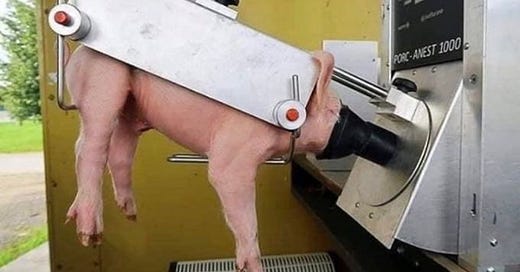In today's society, discussions surrounding animal welfare and ethics are becoming increasingly prevalent. One such topic is the practice of anesthetizing pigs for castration, purportedly to adhere to animal welfare standards.
However, a critical examination of this practice reveals its inadequacy in truly safeguarding animal rights. In this essay, I will condemn the notion of using PorcAnest 3000 as a token gesture towards animal welfare and advocate for veganism as a more ethical and moral choice to protect the rights of animals.
The Fallacy of PorcAnest 3000
PorcAnest 3000, a method designed to anesthetize pigs during castration, is often touted as a humane approach to animal management. While it may seem compassionate on the surface, it fails to address the fundamental ethical concerns inherent in exploiting animals for human consumption. The use of anesthesia during castration does not negate the inherent cruelty of subjecting pigs to a life of captivity, abuse, and eventual slaughter.
Firstly, the very fact that pigs are raised for human consumption highlights the exploitative nature of the industry. Despite being anesthetized during castration, pigs continue to endure lives of confinement and deprivation, devoid of the freedom to express natural behaviors. The inherent value of these sentient beings is disregarded, and reduced to mere commodities for profit.
Furthermore, the efficiency-driven approach of PorcAnest 3000, where piglets are processed in multiple stations for increased productivity, underscores the prioritization of economic gains over ethical considerations. This mass production mentality perpetuates a cycle of exploitation, where animals are treated as mere units of production rather than sentient individuals deserving of respect and dignity.
‘‘Factory farming stands as a stark monument to human indifference, where efficiency eclipses empathy and profit outweighs compassion. True progress demands we condemn such practices, advocating instead for a world where respect for all life forms defines the essence of our humanity.’’
The Ethical Superiority of Veganism
In contrast to the flawed practices of PorcAnest 3000, veganism offers a principled stance against the exploitation of animals for human consumption. By abstaining from animal products altogether, vegans reject the notion of commodifying sentient beings for the satisfaction of human desires. Veganism aligns with the core principles of compassion, justice, and respect for all living beings.
Moreover, embracing a vegan lifestyle promotes sustainability and environmental stewardship. The animal agriculture industry is a leading contributor to environmental degradation, including deforestation, water pollution, and greenhouse gas emissions. By reducing or eliminating the consumption of animal products, individuals can mitigate their environmental footprint and contribute to a more sustainable future for all species.
Conclusion
The use of PorcAnest 3000 as a purported solution to animal welfare concerns falls short of addressing the inherent ethical dilemmas of exploiting animals for human consumption. Instead, it perpetuates a system of exploitation and cruelty under the guise of compassion. In contrast, veganism offers a principled and ethical alternative, grounded in compassion, justice, and respect for all living beings. We must advocate for a shift towards a vegan lifestyle to truly uphold the rights and welfare of animals.
Source:
PROMATEC Automation AG - Industrial Automation - Storage System
General Resources
Books:
Dominion: The Power of Animals in Nature and in Our Imagination by Matthew Scully
Animal Liberation by Peter Singer
Eating Animals by Jonathan Safran Foer
A Billion Hungry Mouths: Feeding the World Without Consuming the Planet by Colin Tudge
Websites and organizations:
Documentaries:
Academic articles:
"The Case for Animal Rights" by Tom Regan
‘‘Why We Love Dogs, Eat Pigs, and Wear Cows: An Introduction to Carnism’’ by Melanie Joy
‘‘Animal Rights: The Abolitionist Approach’’ by Gary L. Francione
‘‘Fellow Creatures: Our Obligations to the Other Animals’’ by Christine Korsgaard
Receive a single informative article daily at 12:01 AM by email. For additional updates, explore my homepage with exciting vegan and plant-based news content and delightful and delicious recipes. Stay connected to the vegan world and all it has to offer.
Visit The Vegan Project Global our Facebook page for more vegan outreach and education.
Also, visit our new YouTube channel
The information on this vegan/plant-based blog is for general informational purposes only. It is not intended as legal, medical, or professional advice. Readers should consult with appropriate professionals for specific advice tailored to their situation. The blog owner is not responsible for any reliance on the information herein.




